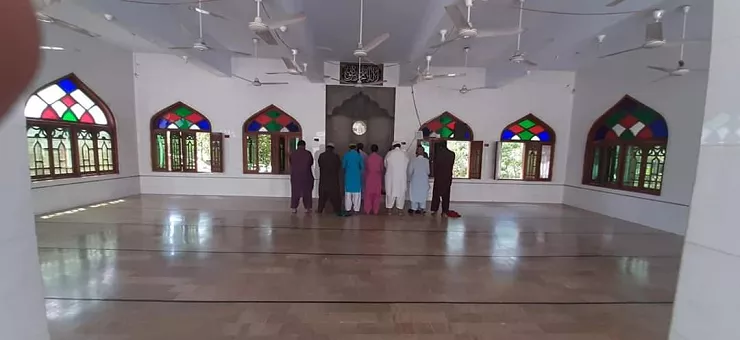Religious groups forced to stay away from places of worship
Members of all communities cancel upcoming events to curb virus spread
LAHORE: In a more aggressive push for physical distancing to prevent the spread of COVID-19, places of worship across Punjab are suspending regular prayer services.As the province grapples with a rapid increase in infected cases, religious groups have decided to cancel all gatherings and congregational prayer services.
“Several important events, including the upcoming Easter Mass, will not take place this year due to the pandemic,” said Pastor Shahid Miraj. All churches, he said, will remain shut during the health crisis. “Only essential church staff comes in every day,” the pastor said.
Fearing an increase in the overall number of infected cases across the country, the government has already limited the Friday prayers at mosques in many parts of the country. According to health experts, Punjab being the most populous province also remains the most vulnerable to the virus.
NICVD offers Sindh govt assistance to set up mobile labs for COVID-19 testing
With uncertainty over the lockdown duration and restrictions over public gatherings, it appears that during the upcoming Ramadan, the holiest month of the Islamic calendar, the overwhelming Muslim population in the province, might not be able to gather for the Salat Tarawih. If the lockdown continues in the province, clerics said, the community might not be able to gather for the Lailat ul Bara’h or more commonly known as the night of forgiveness.
In a statement, prominent clerics and scholars including Tahir Mehmood Ashrafi, who is the current chief of All Pakistan Ulema Council (PUC), said those prevented by the government to offer prayers at mosques are exempted by the Sharia law. Earlier, clerics and PUC urged all followers to offer Friday prayers at home.
Last month, the global disruption caused by the coronavirus forced the Kingdom of Saudi Arabia to close the holy cities of Mecca and Medina, an extraordinary decision. “This is unprecedented. “The holy sites were open even during the 1918 flu, which killed millions worldwide,” said one cleric.
Similarly, the Sikh community canceled all upcoming religious events. Members of the community will celebrate Vaisakhi, the beginning of the Sikh New Year, observed with prayer services in gurdwaras, quietly at their homes. “Extraordinary times require extraordinary measures. We need to stay away from each other to protect each other,” said one Sikh worshiper.
Sardar Satwant Singh, the Pakistan Sikh Gurdwara Prabandhak Committee (PSGPC), said that pilgrims were all set to visit for the New Year celebration in April. Now, due to the lockdown in Pakistan and India, he said, pilgrims will not be able to celebrate the event.
Across Pakistan, the government is implementing strict control over public gatherings to prevent the spread of COVID-19, the deadly respiratory disease that has claimed more than 70,000 lives worldwide.
Tales of survivors: ‘I became so paranoid, I thought doctors would kill me’
Public health experts and elected officials all over the country have urged avoidance of religious or non-religious events involving large audiences, since the onset of the deadly respiratory disease. According to details gathered by the Express Tribune, believers of all faiths are paying attention to declarations and staying away from such gatherings.
The Hindu community, too, seems to be following the instructions and staying away from temples. With the world turned upside down by the spread of the coronavirus, community leaders fear they will not be able to celebrate Navaratri. The nine-day period is considered the Hindu New Year. The community marks this period with fasting, masses worshipping, offerings at temples and festivals.
With COVID-19 restrictions, it seems the community will not be able to mark the event together this year. “We prefer being safe rather than sorry,” said one worshiper.
Published in The Express Tribune, April 7th, 2020.


COMMENTS
Comments are moderated and generally will be posted if they are on-topic and not abusive.
For more information, please see our Comments FAQ